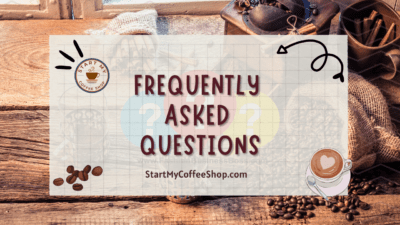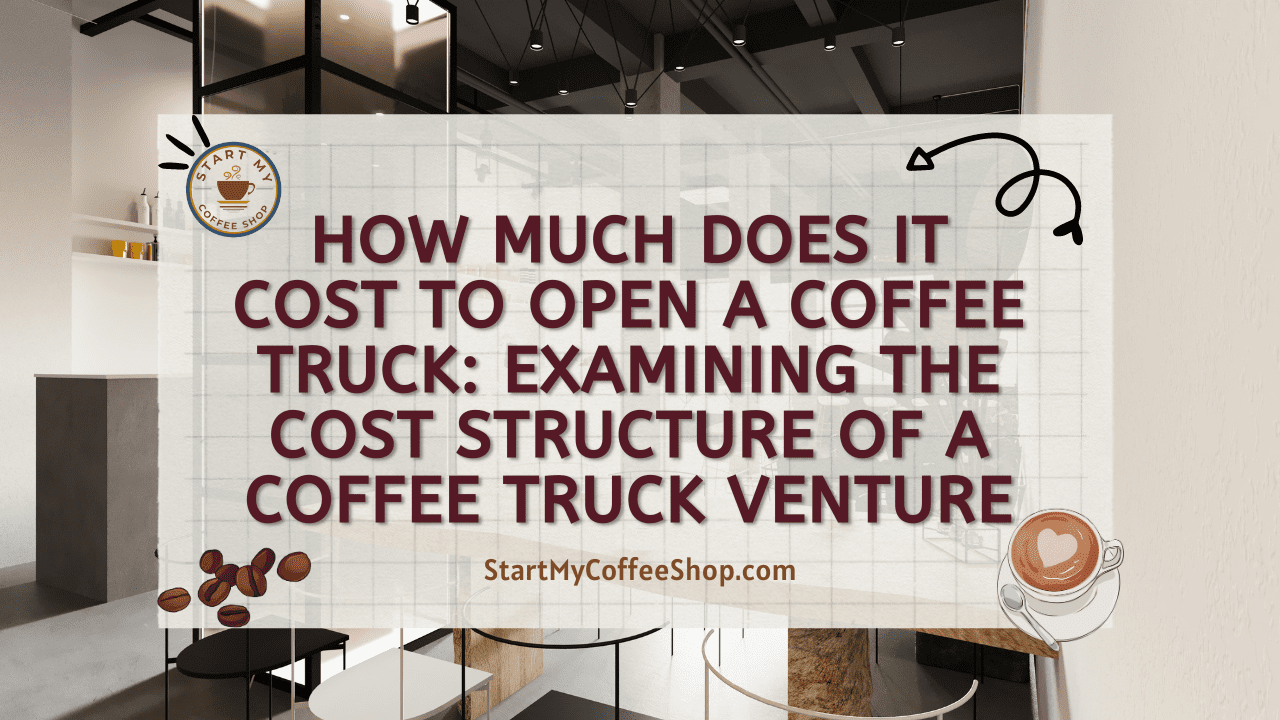Opening a coffee truck business has become a popular venture for aspiring entrepreneurs seeking to serve up delicious brews on the go. However, before embarking on this caffeinated journey, it’s crucial to understand the financial investment involved.
The estimated cost of starting a coffee truck business can vary, but it typically ranges between $50,000 and $100,000, depending on factors such as the size of the truck, equipment, permits, licenses, branding, and initial inventory.
In this article, I will delve into the various factors that contribute to the cost of opening a coffee truck business, providing you with a comprehensive breakdown to help you plan and budget effectively.
1. Vehicle and Equipment Costs
When starting a coffee truck business, one of the primary expenses to consider is acquiring a suitable vehicle. The cost of the truck can vary depending on your preferences, budget, and the condition of the vehicle. You have the option to purchase a used truck and retrofit it for your coffee operations or invest in a brand-new custom-built coffee truck.
If you opt for a used truck, the cost can range from $20,000 to $80,000 or more, depending on factors such as the age, mileage, and overall condition of the vehicle. It’s important to thoroughly inspect the truck for any mechanical issues and ensure that it meets your specific requirements. Retrofitting the truck to accommodate coffee equipment, countertops, and storage will also incur additional costs.
On the other hand, investing in a brand-new custom-built coffee truck offers the advantage of starting with a vehicle specifically designed for your business needs. This option provides greater control over the layout, design, and functionality of the truck.

However, it comes with a higher price tag. Custom-built coffee trucks can range from $50,000 to $150,000 or more, depending on the size, customization options, and additional features.
In addition to the vehicle cost, you need to factor in the expenses for essential coffee equipment. This includes items such as coffee machines, grinders, refrigerators, generators, water tanks, and storage units. The cost of these equipment items can vary depending on the quality, brand, and specifications you choose.
For instance, a commercial-grade espresso machine can range from $2,000 to $10,000, while a high-quality grinder can cost between $500 and $2,000. Refrigerators and storage units to store ingredients and supplies can range from $1,000 to $5,000, depending on their size and specifications. Generators and water tanks are essential for providing power and water supply to your coffee truck and can cost between $1,000 and $5,000 or more, depending on the capacity and quality.
It’s important to carefully research and compare prices for equipment to find the best options that suit your budget and meet the demands of your coffee truck business. Keep in mind that investing in reliable, durable equipment is crucial for maintaining high-quality operations and ensuring customer satisfaction.
By considering the costs of acquiring a suitable vehicle and essential coffee equipment, you can better plan and budget for your coffee truck business. These investments will form the foundation of your mobile coffee operation and play a significant role in providing a quality experience to your customers while maximizing your business’s profitability.
Read more about Cost to Startup a Coffee Shop: Unveiling the Startup Costs
2. Permits, Licenses, and Insurance
When operating a coffee truck business, it is essential to obtain the necessary permits and licenses required by your local government. The specific permits and licenses can vary depending on your location and the regulations in place. Common permits include health department permits, business licenses, parking permits, and food handling certifications.
Health department permits are typically required to ensure that your coffee truck meets health and safety standards. The cost of obtaining these permits can range from $100 to $1,000, depending on the jurisdiction and the specific requirements. This cost may include fees for inspections and compliance checks.
Business licenses are necessary to legally operate your coffee truck business. The cost of obtaining a business license can vary significantly depending on the location and the type of business structure you choose. These costs can range from $50 to $500 or more, depending on the region and the duration of the license.
Parking permits may be required if you plan to set up your coffee truck in specific areas or participate in events that require designated parking spaces. The cost of parking permits can vary depending on the location and the duration for which you require the permits. It is advisable to contact the local parking authorities to inquire about the associated costs and regulations.
Food handling certifications are often mandatory for businesses involved in the preparation and serving of food. The cost of obtaining food handling certifications can range from $100 to $500, depending on the type of certification required and any training programs that may be necessary.
Insurance is another crucial aspect to consider when operating a coffee truck business. Liability insurance is essential to protect your business, employees, and customers in case of accidents or injuries. Auto insurance is necessary to cover the vehicle itself. The cost of insurance premiums can vary depending on factors such as coverage limits, location, and the number of employees. On average, you can expect to spend around $2,000 to $5,000 per year on insurance for your coffee truck business. It is advisable to consult with insurance providers to understand the specific coverage options and associated costs.
It is important to note that the costs mentioned above are estimates and can vary depending on various factors such as the location, size of the business, and specific requirements of your local government. It is recommended to research and consult with local authorities to determine the exact permits, licenses, and insurance coverage needed for your coffee truck business and to accurately assess the associated costs.
By ensuring that you have the necessary permits, licenses, and insurance coverage, you can operate your coffee truck business legally and protect yourself and your customers. These costs are an essential investment in maintaining compliance, safeguarding your business, and providing a safe and enjoyable experience for your customers.
3. Branding and Marketing
This involves developing a cohesive visual identity, creating an attractive logo, and crafting a compelling brand story that resonates with your target audience. Working with a professional designer or branding agency can help bring your vision to life and ensure a consistent and visually appealing brand image. The cost of hiring a professional designer can range from $1,000 to $5,000, depending on the complexity of the project and the level of expertise required.
Marketing expenses are another consideration when opening a coffee truck business. Promoting your business and attracting customers requires strategic marketing efforts. Designing and printing marketing materials such as menus, flyers, business cards, and signage will incur costs.
The price can vary depending on factors such as the quantity, quality, and design complexity of the materials. On average, budgeting between $500 to $2,000 for printing and design costs is a reasonable estimate.
In today’s digital age, online marketing plays a significant role in reaching potential customers. Developing a professional website that showcases your menu, location, and brand story is essential. The cost of website development can vary depending on the complexity and functionality required, ranging from $1,000 to $5,000 or more. Additionally, allocating a budget for ongoing website maintenance and updates is recommended.
Social media management is another important aspect of online marketing. This involves creating and managing social media accounts to engage with your audience, share updates, and promote your coffee truck. While managing social media accounts yourself is a cost-effective option, you may choose to outsource this task to a social media manager or marketing agency. Depending on the level of service and expertise, social media management costs can range from $500 to $2,000 per month.
Online advertising can also be a part of your marketing strategy. Platforms like Google Ads and social media advertising allow you to reach a wider audience and drive traffic to your website or coffee truck. The cost of online advertising varies depending on factors such as the target audience, campaign objectives, and duration of the campaign. It is advisable to start with a smaller budget and adjust based on the results and effectiveness of your ads.
By allocating a budget for branding and marketing efforts, you can create a strong brand presence and effectively promote your coffee truck business. These investments in visual identity, branding, and marketing will help attract customers, build brand recognition, and increase your chances of long-term progress in the competitive coffee industry.
4. Initial Inventory and Supplies

Stocking up on coffee beans, syrups, milk, cups, lids, and other essential supplies is a crucial step in ensuring the smooth operation of your coffee truck business. The initial inventory cost will vary depending on factors such as the size of your truck, the variety of beverages and snacks you plan to offer, and your projected sales volume.
Coffee beans are the heart and soul of your business, and investing in high-quality beans is essential to delivering a flavorful and satisfying cup of coffee. The cost of coffee beans can vary depending on the variety, origin, and supplier. On average, you can expect to spend around $500 to $1,000 on coffee beans initially. It’s important to consider factors such as the popularity of different coffee blends and the preferences of your target audience when determining your inventory needs.
In addition to coffee beans, you will need to purchase various syrups to add flavor and variety to your menu. The cost of syrups depends on the brand, size, and flavors you choose. Anticipate spending around $200 to $500 on syrups initially. It is advisable to select popular flavors and consider customer preferences to ensure a well-rounded offering.
Milk is an essential ingredient for many coffee-based beverages. Depending on your menu and the volume of milk-based drinks you expect to sell, you will need to budget for an appropriate supply of milk. The cost of milk can vary depending on factors such as the type (dairy, non-dairy), quality, and quantity. It is advisable to establish relationships with local suppliers to secure a reliable and cost-effective source of milk.
Cups and lids are necessary for serving your beverages to customers. The cost of cups and lids can vary depending on the size, material, and design. It is recommended to invest in durable and environmentally friendly options. Anticipate spending around $300 to $600 on cups and lids initially, keeping in mind the estimated sales volume and the need for different sizes and types of cups.
Other essential supplies such as stirrers, napkins, and sugar packets should also be factored into your initial inventory costs. These items are relatively inexpensive but necessary to provide a complete customer experience. Budget around $100 to $300 for these supplies initially, considering the estimated sales volume and the need for regular restocking.
It is important to monitor and manage your inventory carefully to avoid waste or shortages. Keeping track of sales data and customer preferences will help you refine your inventory management strategy over time. By maintaining a well-stocked inventory, you can ensure that you are prepared to meet customer demands and provide a seamless and enjoyable coffee experience.
Read more about Cost to Open Coffee Shop Average: From Concept to Cash Register
5. Operational Expenses
Running a coffee truck business entails a range of ongoing operational expenses that need to be factored into your budget. These expenses include fuel costs, vehicle maintenance and repairs, employee wages, credit card processing fees, and utilities required for operating onboard equipment. The monthly costs associated with these expenses can vary depending on factors such as your location, the size of your truck, and your staffing needs.
Fuel costs are a significant consideration for a mobile business like a coffee truck. The amount spent on fuel will depend on various factors, including the distance traveled, the frequency of your operations, and the current price of fuel in your area. It is crucial to estimate your average fuel consumption based on your route and projected sales volume to determine the monthly fuel expenses accurately.
Vehicle maintenance and repairs are essential to keep your coffee truck running smoothly and ensure the safety of your staff and customers. Regular maintenance tasks such as oil changes, tire rotations, and engine tune-ups are necessary to prevent breakdowns and extend the lifespan of your vehicle. Additionally, unexpected repairs may arise from time to time. It is advisable to set aside a monthly budget for vehicle maintenance and repairs to account for routine servicing and any unforeseen issues that may arise.
Employee wages are another significant expense to consider. The number of employees you hire will depend on your business needs and the level of service you aim to provide. It is important to factor in not only the base wages but also any additional costs such as payroll taxes and employee benefits. Determining a fair wage for your employees while keeping it within your budget is essential for sustaining a great coffee truck business.
Credit card processing fees are incurred when customers choose to pay with a credit or debit card. These fees are typically a percentage of the transaction value, and they can vary depending on your payment processor and the type of card being used. It is advisable to research different payment processors and compare their fees to choose the most cost-effective option for your business.
Utilities, such as water and electricity, are essential for operating onboard equipment like coffee machines, grinders, and refrigerators. The cost of utilities will depend on factors such as the efficiency of your equipment and the volume of beverages you serve. It is crucial to estimate your monthly water and electricity consumption accurately to determine the associated costs.
On average, the combined monthly expenses for fuel, vehicle maintenance, and repairs, employee wages, credit card processing fees, and utilities can range from $3,000 to $6,000. However, it is important to note that these figures are estimates and can vary based on individual circumstances and business operations.
Monitoring and tracking your ongoing operational expenses are crucial for maintaining profitability and financial stability in your coffee truck business. By regularly reviewing and adjusting your budget based on actual expenses and sales performance, you can optimize your operations and ensure long-term growth.
6. Miscellaneous Costs
Apart from the significant expenses outlined earlier, there are additional miscellaneous costs that should be taken into account when opening a coffee truck business. These expenses often arise during the planning and operational stages and can impact your overall budget. It is crucial to consider these miscellaneous costs to avoid any financial surprises down the road.
One aspect to consider is the legal fees associated with setting up your business structure. Consulting with a lawyer or professional advisor can ensure that you establish the right legal framework for your coffee truck business, protecting your interests and ensuring compliance with local regulations. These fees can vary depending on the complexity of your business structure and the expertise of the professional you engage.
Accounting services are another important consideration. Hiring an accountant or bookkeeper can help you maintain accurate financial records, handle tax obligations, and provide valuable financial insights. The cost of accounting services will depend on the extent of assistance required and the rates charged by the professionals you choose to work with.
Creating an online presence is essential in today’s digital age, so website hosting and domain fees should be factored into your budget. Investing in a professional website and securing a domain name will allow you to showcase your coffee truck business and attract potential customers. The cost of website hosting and domain fees can vary based on the provider and package you select.
With the increasing popularity of mobile payments, it is important to consider mobile payment processing fees. These fees are charged by service providers to process payments made through mobile platforms, such as smartphones or tablets. Researching different payment processors and their associated fees will help you choose the most cost-effective option for your coffee truck business.
Lastly, unforeseen expenses can arise during running your coffee truck business. It’s wise to allocate a buffer of around 10% of your total budget to account for these unexpected costs. This will provide you with a safety net to handle unforeseen repairs, emergencies, or any other expenses that may arise along the way.
Summary
Opening a coffee truck business can be an exciting venture. However, it’s important to carefully consider the costs involved to ensure a great launch and sustainable operations.
By taking into account the vehicle and equipment costs, permits and licenses, branding and marketing expenses, initial inventory and supplies, operational expenses, and miscellaneous costs, you can create a comprehensive budget and navigate the financial aspects of your coffee truck business with confidence.
Best of luck on your coffee-filled journey!
Frequently Asked Questions

Question: What permits and licenses are needed to operate a coffee truck?
Generally, you will need health department permits, business licenses, and potentially parking permits.
Question: How much initial inventory is needed to start a coffee truck business?
On average, budgeting between $2,000 to $5,000 for initial inventory is a good starting point.
Question: What are the operational costs associated with running a coffee truck?
Operational costs for a coffee truck include fuel expenses, vehicle maintenance, employee wages, credit card processing fees, and utilities. These costs can range from $3,000 to $6,000 per month, depending on various factors such as location and staffing needs.
To learn more on how to start your own coffee shop checkout my startup documents here
Please note: This blog post is for educational purposes only and does not constitute legal advice. Please consult a legal expert to address your specific needs.

Hi! I’m Shawn Chun
My adventure in coffee began when I first launched my first coffee shop back in the early 2000s. I had to figure out so many things on my own and to make it worse within 2 years of opening two large corporate coffee chains moved in just blocks away from me!
As I saw smaller and even some larger coffee shops in the neighborhood slowly lose customers to these giant coffee chains and slowly close up shop, I knew that I had to start getting creative…or go out of business.
I (like you may be) knew the coffee industry well. I could make the best latte art around and the foam on my caps was the fluffiest you have ever seen. I even had the best state-of-the-art 2 group digital Nuova Simonelli machine money could buy. But I knew that these things alone would not be enough to lure customers away from the name brand established coffee shops.
Eventually, through lots of trial and error as well as perseverance and creativity I did find a way to not only survive but also thrive in the coffee/espresso industry even while those corporate coffee chains stayed put. During those years I learned to adapt and always faced new challenges. It was not always easy, however, in the end, I was the sole survivor independent coffee shop within a 10-mile radius of my location. Just two corporate coffee chains and I were left after that year. All told the corporate coffee chains took down over 15 small independent coffee shops and kiosks and I was the last one standing and thriving.
Along the years I meet others with the same passion for coffee and I quickly learned that it is not only “how good a barista is” that makes a coffee shop successful, but the business side of coffee as well.
Hence why I started this website you are on now. To provide the tools and resources for up and coming coffee shop owners to gain that vital insight and knowledge on how to start a coffee shop successfully.
Stick around, browse through my helpful blog and resources and enjoy your stay! With lots of LATTE LOVE!
Shawn







